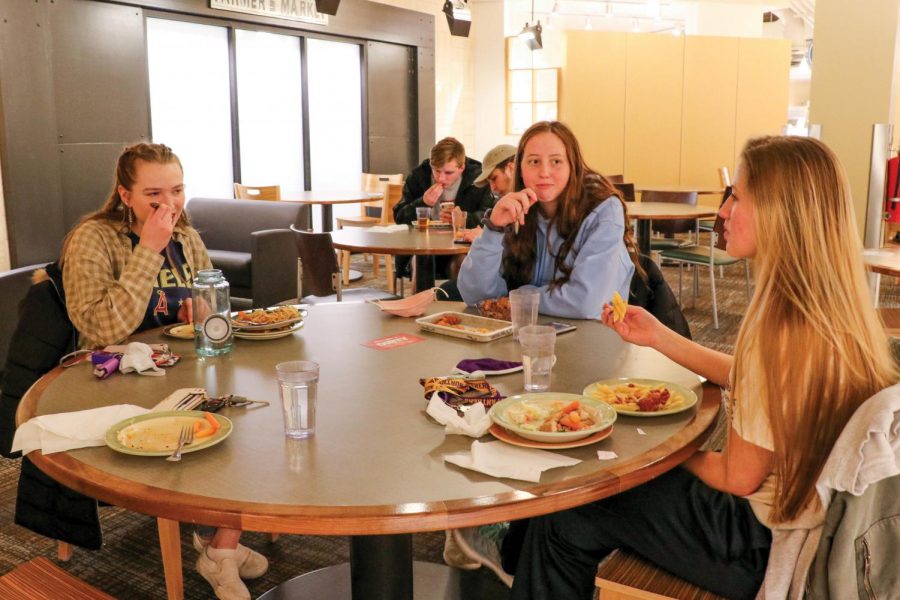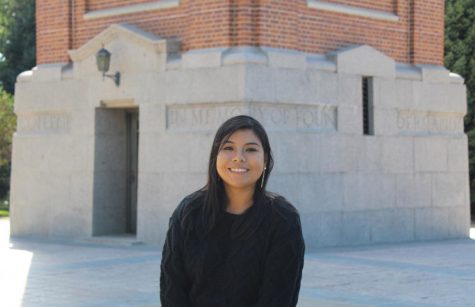Students dissatisfied with dining
Students speak out about not being satisfied with the options available in the dining hall.
Feb 25, 2021
UNI freshmen Annahlee Huspen and Madison Mason have taken to the Facebook group “UNI Class of 2024” to advocate for more dietary options at the UNI dining centers and a partial refund for meal plans.
Both Huspen and Mason noted that UNI is known to have the best college food in Iowa. While they enjoy the food offered by the university, they feel it is unfair for students who are required to have all-access meal plans to pay full price for what they feel is a limited number of options. (This spring, the university did make a one-week adjustment to reduce the rates of the all-access and Weekly 5 meal plans.)
After speaking with fellow students, Huspen and Mason learned that options are further limited for students who are vegetarian, vegan, gluten-free, dairy-free or practice certain diets due to religious beliefs or health reasons.
“I had no idea that people with these specified diets were really struggling this hard,” Huspen said. “That really upset me.”
Mason, a music education major, posted a video in the “UNI Class of 2024” group showing a lack of food at Piazza at 10 a.m. on a Tuesday, during late breakfast. She posted the video, she said, to raise awareness and to spark a conversation among group members.
Mason, who is required to have an all-access meal plan due to where she lives on campus, said that due to her class schedule, she is unable to eat at dining centers when most of their food is available. By the time she can sit down and eat, she is limited to a few options like pizza, salad and cereal. She wishes UNI allowed students who are required to have all-access plans to change their plans to more affordable ones.
Huspen, a graphic design major, joined the conversation in the Facebook group and offered to write an email to UNI administrative and Housing and Dining staff to address students’ concerns.
Huspen, who is also required to have an all-access meal plan, is a rugby player and also has a job. She said it can be difficult for her to find a variety of food at the dining centers outside peak serving times.
Her email advocates for more dietary options and partial refunds and includes six anonymous statements from fellow UNI students.
“We as a student body demand compensation for the lack of effort proven to us throughout the Dining Halls, Convenience Stores, and Maucker Union,” part of the statement in the email reads. “At minimum, we expect a half refund on our meal plans for the Spring 2021 semester.”
The statement expresses disappointment in changes like the closing of Maucker Union Food Court and Schindigs, reduced hours at Chats and Essentials and fewer menu options at the 23rd Street Market.
“This was infuriating to those of us that are left on campus,” the statement reads. “We are now forced to spend our dining dollars on the over-priced convenience stores, which also provide limited options.”
The anonymous statements also pose several concerns. One student shared that they have lost weight due to the lack of food.
Another questioned why UNI does not allow students to use to-go meals after eating in a dining center, which would give them something to eat when they cannot make it to a dining center during its peak serving hours. University Housing & Dining says that to-go meals are available but does not share why students cannot use one immediately after eating in a dining center. Instead, they are asked to come at a separate time, when they are not planning to eat in the dining center, and fill a to-go box then.
Another student expressed concern regarding limited hours since students flock to dining centers at one time, something they said is dangerous during a pandemic.
One student wrote they were promised gluten-free meals when attending UNI and that they could order food if they didn’t see any. However, the gluten-free food available offers little variety: chicken breast with a side of potato or rice. The rice is sometimes mushy or crispy and the potatoes charred or raw.
“There was one night specifically that I came to the dining center at 5:35 p.m., 35 minutes after the dining center had opened for dinner, and there was no gluten free food left for me,” the student wrote. “After asking if there would be more the chef just said, ‘I don’t know.’ I asked what he expected me to eat for dinner and he said, ‘I don’t know.’ I was so upset that I went without dinner that night.”
The student ended their statement with, “Unfortunately, if I don’t see any changes I will not be back next year. I refuse to give money to a school that will not be inclusive and accommodating to all disabilities. Whether you believe it or not, celiac disease is a disability, and it needs to be taken seriously, and I strongly believe that UNI is not taking it seriously.”
Huspen sent the email relaying her and fellow students’ concerns on Friday, Feb. 19, and has received one reply from a UNI staff member thus far. She hopes staff are discussing the concerns posed in the email, and she plans to continue being part of this conversation going forward if changes aren’t made.
Fellow freshmen have offered to help Huspen take a stance, if necessary, and she encourages other students to express their concerns with the dining centers if they have them. Mason plans to take a step back from speaking up but hopes students continue to advocate for the dining centers to make accommodations.
“It’s just not a normal semester,” Mason said, “and the students understand that, but you can’t charge them as if it still is.”










Tom Ganoe • Mar 1, 2021 at 5:36 pm
I am a vegetarian. I understand the limited selection on food may be an annoyance on campus, but it is part of the lifestyle. I have spent many years knowing that the only thing I can order on a menu is “veggie _____”. Especially in a state like Iowa, you should learn to be happy eating side dishes. It’s what all my friends who are vegetarian and I do.